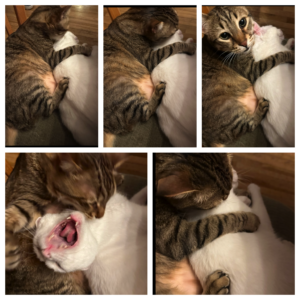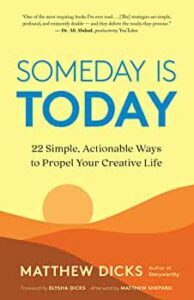Matthew Dicks's Blog, page 92
April 11, 2023
Letting Loose
Letting loose is an act of such beauty and courage.
Also such joy and intelligence.
Elysha shared this with me last week, and I’ve scrolled through it several times since.
It’s served as a useful, welcomed, and much-needed reminder of…
“…a world of possibility, one in which adulthood could be fun, with surprise waiting around every corner.”
“…a reality in which a mundane routine could spontaneously give way to a goofy public party.”
“… even the most seemingly unremarkable person has a mysterious interior life and untold capacity for pleasure.”
It’s a reminder that “I’m capable of having fun, of being spontaneous, of forgetting myself long enough to join a conga line at a wedding reception.”
Smart words from a brilliant piece of digital art.
Don’t spend your life avoiding silliness, outrageousness, and public spectacle.
Your only reward will be quiet, unnoticed regret.
Thank you, Shane O’Neill.

April 10, 2023
Plan A
I was listening to Ira Glass of This American Life discussing the concept of a Plan B for an episode of the same name. In a room of one hundred people, he asked the audience to raise their hands if they were still on the path to their Plan A:
The one thing that wanted to do with their life originally.
Plan A could relate to a job, a lifestyle, or a family. It is whatever they envisioned their lives as a child, a teenager, or perhaps just coming out of college. Glass wanted to know how many people had achieved their Plan A or were still on the path towards it.
In that room of 100 people, just one person raised her hand. She was a twenty-three-year-old college student.
Many reported to already be on Plan D or E.
Glass went on to say that most people in the world are already on Plan B and that this was perfectly normal. Nothing at all wrong with moving onto Plan B.
I want to quibble with Glass a bit.
Plan B may be perfectly normal, and there may be nothing wrong with moving on to Plan B, but the rationale and reason behind the need for Plan B must be examined closely.
Are you on Plan B because you decided that Plan A wasn’t right for you?
Or were you instead forced to find a Plan B when Plan A became too difficult or impossible to attain?
Did you choose Plan B because you discovered something even more appealing than your original Plan A?
Or did you choose Plan B because Plan A required too much effort?
Had I been in the room with Ira Glass that day, I would’ve also raised my hand, indicating that I am also currently on Plan A.
As a child, I wanted to be a teacher. I remember being eight years old, standing before a Fisher Price blackboard, teaching my younger brothers and sisters everything I knew about geography and math. I remember writing to Santa, asking for a globe, an atlas, and some chalk to help teach my class, and I remember unwrapping them on Christmas morning.
Part of my desire to teach was born from a desire (which still exists today) never to grow up, and the rest came from my love for working with children and my desire for autonomy. After a longer, perhaps more difficult journey than most, I am a teacher today, enjoying nearly a quarter century in the profession.
But in high school, I also decided that I wanted to be a writer. I wasn’t sure if I wanted to be a journalist, a poet, or a novelist, but I knew I wanted to write.
I often said that my dream was to “write for a living and teach for pleasure.”
So I started writing, first for the high school newspaper, then on early, localized versions of the internet. I filled journals with words, wrote letters to friends, and published my own newsletters and zines. I went to college to earn a degree in creative writing. I wrote short stories, poetry, and columns for the college newspaper. In 2003 I began blogging every day, and eventually, I started writing books. In 2009, I published my first novel, and I’ve published six novels and two books of nonfiction since. I also write columns for two magazines. I’ve written musicals, comic books, magazine pieces, and a rock opera.
It took a long time to get published – nearly two decades after I first dreamed the dream – but it finally happened.
But then in college, I took a class on public speaking with the great Pat Sullivan – the best and most important class I’ve ever taken – and immediately decided that I also wanted to stand in front of audiences and perform for the rest of my life.
So I entered and won statewide debate contests, was elected to a position in student government, and launched a wedding DJ business with my friend, Bengi. Eventually, the desire to perform led me to The Moth and storytelling. Soon after, Elyshaa and I launched our own storytelling company, Speak Up. I began performing on stages around the world. Later, I turned my attention to inspirational addresses, TEDx Talks, and stand-up comedy. I got ordained online so I could officiate weddings and work as a substitute minister at Unitarian Universalist churches.
Today I speak to audiences constantly, both in real life and online, and it has oddly turned into a career. Today I consult with Fortune 100 companies, small businesses, nonprofits, universities, attorneys, politicians, the clergy, and many more on communications, storytelling, and public speaking.
My childhood dream of becoming a teacher, my teenage dream of becoming a writer, and my college dream of becoming a performer have all come true.
Plan A has been achieved. But it took a long time.
I was 24 years old when I finally entered college, 28 years old when I began my teaching career, 36 years old when I sold my first novel, and 38 years old when I started being paid to perform. The road wasn’t easy, but I made it.
I still have other dreams to fulfill – other parts of my Plan A that I continue to pursue – but most importantly, I remain on the original path, working toward the goal. And I have always been on this path, even when I was managing fast-food restaurants, working as a bank teller, and picking up scraps for cash at construction sites.
Even when I was homeless, hungry, and facing a prison sentence, I was fighting for my future.
Each of these moments was viewed as a stepping stone toward my ultimate goal.
I’d hate to think that someone like Ira Glass (who I like very much) might be assuring people everywhere that Plan B is always perfectly acceptable.
Plan B is an excellent idea when you dream a new dream, change your mind, or discover a new corner of the world. I have friends who shifted gears in life not out of necessity but because of a change in desire. A person who thought he wanted to work with computers becomes a teacher in midlife after discovering a talent and desire he didn’t know he possessed. A friend who never wanted children decides to have three kids after marrying the right person. A recently divorced friend swears off marriage for the rest of his life until the perfect woman comes along and changes his mind. A friend sees a business opportunity too good and exciting to pass up and pivots his career midstream,
These are not examples of people shifting to Plan B or Plan C when all hope is lost. These are people widening their views. Expanding their beliefs. Accepting change.
But to give up entirely on Plan A when it remains a burning desire strikes me as tragic and foolish. Giving up on Plan A when it seems impossible is stupid. Surrendering your Plan A because it won’t be as enormous and shiny as you once dreamed makes no sense.
I know someone who wanted desperately to be an actor. When Hollywood didn’t work out, they switched gears to another line of work, which made sense.
Making a living is important.
But their burning desire to perform never died. They still want to act, but instead of performing in local theater or writing their own one-person show or creating a YouTube show where they could perform online, they walked away from their Plan A. Gave up on it entirely.
Hollywood or bust.
This is not the discovery of a better Plan B. This is a surrendering of a Plan A because it wasn’t as fancy or easy as they once dreamed.
Elysha recently met a woman who loved to read and write but has given up both because her job is demanding and her attention span has waned. She actively laments the loss of that past life, but rather than fighting for it, she has surrendered to mediocrity.
I could go on and on. Friends, colleagues, acquaintances, clients, and even former students who dreamt of being or doing something, only to switch to Plan B when Plan A didn’t happen fast enough or become too onerous to continue or demanded too much courage or sacrifice.
These are tragedies. Recipes for disaster. I think decisions like these lead to enormous feelings of regret later in life.
Sometimes Plan A requires more time, effort, and suffering to achieve.
Sometimes Plan A assumes a smaller, more achievable form.
Sometimes Plan A is impossible to achieve but still worthy of a lifelong pursuit.

April 9, 2023
My writing pals
On most early mornings, long before the sun rises, I sit at the dining room table and write.
Sitting on the chair beside me are my two cats, Tobi and Pluto.
I can’t tell you how much joy this brings me.
These two little guys could be sitting anywhere in the house – couches, beds, and cozy chairs – but instead, they squeeze themselves onto a dining room chair in order to sit beside me.
Joy, I tell you. Absolute joy.
And because of their frequent presence, I am privy to some highly entertaining moments.
Like this:
Pluto, the darker cat, is cuddling with Tobi, the white cat. Holding onto him with his paw, licking his fur, and kneading his skin. Then Pluto stopped, looked up at me as if to say, “Watch this,” and then attacked.
They battled for about ten seconds before settling down again and returning to their previous positions.
I knew it was coming, which is why I managed to photograph the moment. I can’t explain why. Maybe Pluto growled or purred in a way as to signal the oncoming attack.
Or maybe Tobi did something subtle to provoke the assault.
Somehow, I’ve become so attuned to their rhythms that I can predict their movement without understanding how or why.
It’s so good to have such good company.

April 8, 2023
The cure for stage fright
I am often asked how a person can overcome stage fright.
How do you beat back the overwhelming fear of standing in front of an audience in order to tell a story, deliver a keynote, outline an investor pitch, offer a wedding toast, speak to a class, and the like?
First, and perhaps most important, is the knowledge that you are not alone in your fear. Most people – even the most seasoned, experienced speakers and performers – feel nervousness and even abject fear about public speaking. I have found myself in many green rooms over the years, sitting beside people who had been performing for decades, but still, they were nervous.
But even people like me, who almost never experience nervousness of any kind prior to or during a performance, can have our moments.
Earlier this year, I was hired to perform Jewish folktales in concert with a professional orchestra. I struggled mightily to pronounce some of the Yiddish words correctly, so this challenge, along with the composer and an orchestra of professional musicians who were counting on me to get it right, made me feel nervous in a way I had not felt in a long, long time.
The fact that I’m not Jewish probably played a role, too. I felt like a bit of an outsider, unable to pronounce words that others around me spoke with such ease.
Even with all of that weighing on my mind, my degree of nervousness was admittedly infinitesimal when compared with what most people face.
Sadly, there is no magic elixir to eliminate stage fright. No pill or potion that will suddenly fill you with courage.
When it comes to conquering stage fright, I feel like this video says it all.
April 7, 2023
OED additions… 15 years later
Fifteen years ago, I wrote about the Oxford English Dictionary’s latest additions to their tome on this blog.
I thought it would be amusing to review the list and my reactions to those new words more than 5,000 days later.
New words added in 2008 that I am still using today:
catastrophizingmatchy-matchyfrenemysoft skillswardrobe malfunctionI like all of these words and phrases and am happy to use them when needed. It’s kind of amazing to think that they are less than two decades old.
Side note:
I’m well known for anti-catastrophizing – a relentless attempt to rein in the tendency of people to assume that their life is especially difficult, this moment in history is one of the worst, and a particular problem is unsolvable (or even relevant) – but that word (anti-catastrophizing) has yet to be deemed worthy of dictionary inclusion.
Probably because so many damn people are too busy catastrophizing.
New words added in 2008 that I don’t use but are still in the modern lexicon and used with relative frequency:
chillaxchill pillfussbudgetvuvuzelaI hate both “chill pill” and “chillax,” but sadly, I hear them a lot.
I especially hate words and phrases that seem to exist more because of a rhyming scheme than out of necessity.
“Chill pill” fits this despised criteria.
“Vuvuzela” had its moment during the World Cup years ago, but I still remember the word well and assume you do, too. And since it’s the name of a musical instrument, the word should still exist, even if the instrument is used only to annoy people.
Words added in 2008 that I haven’t heard used in any way whatsoever, and rightfully so (I’ve included the definitions, assuming you needed them, too):
bargainous- costing less than is usual or than might be expected; cheap or relatively cheapcool hunter- a person whose job it is to make observations or predictions about new styles and trendsautomagically- automatically and in a way that seems ingenious, inexplicable, or magicalI wonder:
Does the OED recognize the mistake they made with words like these and quietly (or publicly) remove them from the dictionary? I’d hate to think that future generations might believe that we were using words like “bargainous” with any frequency.
New words are announced quarterly. These days, up to one thousand new words are added to the dictionary every year. The June 2022 list, for example, is too long to comment on as I did back in 2008, but it’s still a fun list to read through.
As always, I can’t believe that some words (ankle bracelet, bobsledding, saucepot) weren’t in the dictionary already.
I’m also thrilled to see words added that I didn’t expect to find (Dunning–Kruger, hypersexual, sharesies, sportswashing).
I’m also appalled that some words actually made it into the dictionary (anothery, sharenting).
I think the OED would benefit from a Minister of Stupidity, whose job it would be to declare certain words to be too stupid to include in the dictionary.
“Sharenting” definitely meets this criterion.
If anyone at the OED is reading and thinking this a good idea, I’d be more than willing to become the first Minister of Stupidity. Not only did I create the position, and not only do I think I’m highly qualified for the post as an author, columnist, blogger, teacher, and public speaker, but I love telling people when they are being stupid.
I’m sort of made for the position.

April 6, 2023
Conquering stage fright
I am often asked how a person can overcome stage fright.
How do you beat back the overwhelming fear of standing in front of an audience in order to tell a story, deliver a keynote, outline an investor pitch, offer a wedding toast, speak to a class, and the like?
First, and perhaps most important, is the knowledge that you are not alone in your fear. Most people – even the most seasoned, experienced speakers and performers – feel nervousness and even abject fear about public speaking. I have found myself in many green rooms over the years, sitting beside people who had been performing for decades, but still, they were nervous.
But even people like me, who almost never experience nervousness of any kind prior to or during a performance, can have our moments.
Earlier this year, I was hired to perform Jewish folktales in concert with a professional orchestra. I struggled mightily to pronounce some of the Yiddish words correctly, so this challenge, along with the composer and an orchestra of professional musicians who were counting on me to get it right, made me feel nervous in a way I had not felt in a long, long time.
The fact that I’m not Jewish probably played a role, too. I felt like a bit of an outsider, unable to pronounce words that others around me spoke with such ease.
Even with all of that weighing on my mind, my degree of nervousness was admittedly infinitesimal when compared with what most people face.
Sadly, there is no magic elixir to eliminate stage fright. No pill or potion that will suddenly fill you with courage.
When it comes to conquering stage fright, I feel like this video says it all.
April 5, 2023
14 Ways for Evaluating Character
Ted Gioia, on his Substack The Honest Broker, lists his “8 best techniques for evaluating character.”
It’s a good list.
My only strong disagreement is with his first one:
1. Forget what they say—instead, look at who they marry.He writes:
A person’s choice of a spouse—or, if they aren’t married, their closest lifelong partner—is much more revealing than anything they say or do in public.
I disagree.
I think that their choice of spouse can be instructive in some cases. Still, I also know many people who married someone without the knowledge, wisdom, forethought, and self-awareness to make the best choice. Many of these people remain married today because even though their marriage is hardly ideal, it works.
Or they’re making it work for the kids.
Or they’re not in a financial position to live independently.
Or their spouse was the best person they could find.
My friend Kim says that the most important decision you ever make is choosing who you marry, and I agree. But that choice is sometimes not a good one, not because of a lack of character but because of a multitude of other factors that go into the process of choosing a partner and remaining married to a spouse.
Sometimes we choose a spouse or partner who is less than ideal. Many times that marriage ends in divorce. Sometimes it does not for some good and not-so-good reasons. But I don’t think a person’s choice of spouse is always indicative of who they are.
That said, I made my own list.
I’ve retained five of Gioia’s eight items on his list, changed them slightly, and added a few of my own.
My List of the 14 Best Ways of Evaluating Character
What kind of questions do they ask?How much curiosity do they have about the lives of other people?What do they say about the physical appearance of others?How often do they speak about the physical appearance of others?How politically polarized are they?How do they treat service workers?What experiences formed their character in early life?How do they spend their time?How do they spend their money?How often do they complain?What do they complain about?What do they think is funny?What is their ratio of speaking to listening?How informed are they about national and world events?

April 4, 2023
Topless
Women can now swim topless in swimming pools in Berlin, Germany.
News outlets around the world widely reported on this development in one city in Germany, probably because a story about topless women was likely to yield lots and lots of clicks.
Admittedly, it’s a good and important reform. It’s utterly ridiculous and stupidly Puritanical to allow someone like me to walk through the world topless with near impunity while a woman cannot.
How infantile and silly can we be?
But this new law in Berlin is hardly groundbreaking. Most people don’t know it, but women have legally been allowed to be publicly topless in New York City since 1992. Few women choose this option, but if you’re in Times Square on a busy day, you’ll likely see topless women on the street, oftentimes with their breasts painted. And women have successfully sued the city when an uninformed (or perhaps prudish) police officer arrests them for public nudity.
But women can feel free to shop in Brooklyn, stroll through the Bronx, or relax on a bench in Central Park, completely and legally topless
As it should be.
Other injustices certainly deserve our attention, and many admittedly have far greater deleterious effects on people, but every injustice is worthy of our attention, particularly when they set unequal limits on any segment of society.
Particularly those involving needless, childish, prudish inequalities.

April 3, 2023
Odd intense brilliant
A new review of Someday Is Today: 22 Simple, Actionable Ways to Propel Your Creative Life caught my eye because of the choice of adjectives used to describe me. Written by Derek Hughes, it reads:
_______________________________________
Matthew Dicks is odd, intense, and brilliant. I’m not sure I’d want to live or work with him. Yet his eccentricity gives him unique insights you’ll like.
Many productivity books recycle the same ideas. Dicks doesn’t. You won’t agree with or like everything he says. But you will discover some new ideas that will work.
_______________________________________
He then goes on to offer three of his favorite tips from the book.
I love parts of this review. In particular, I appreciate his acknowledgment that readers won’t like everything I have to say in the book because I experience this often. When someone asks me how to be more productive, my answer is never the magic pill that so many people desire.
People often want to change their life without actually changing their life.
I’m also grateful for his mention that my book isn’t recycling the ideas of others. He’s right. Books on productivity often offer the same strategies or versions of the same strategies.
I’m happy to hear that my ideas are original.
But odd, eccentric, and brilliant?
Brilliant is quite a stretch. Yesterday I missed a chair by a solid two feet while attempting to sit down. I also misread an email and apologized for something I didn’t actually do. I got stuck in a public restroom because I kept pushing on a door that needed to be pulled.
Not exactly Einstein-like behavior.
“Odd” and “eccentric” may be true, but I prefer “nonconforming” and “original.”
But as a writer, I understand his word choice. Some words get more attention than others. Some words spark interest whereas others do not.
As for not being sure if he would like to live or work with me, I am quite certain (and have written verification) that some of my colleagues have not wanted to work with me, at least in the past.
The ones who have expressed this opinion in print are cowardly monsters, but there are probably others who haven’t enjoyed my methods or my witty repartee without needing to express it via written communication and anonymous threats to my career.
Still, I’m also sure that plenty of colleagues over the years have been neutral or better about working alongside me.
Also, doesn’t everyone have someone at work with doesn’t exactly adore them?
As for living with me, this is where I will heartily object. Occupying living quarters with me is utterly delightful.
I’m organized and neat. I’ve always done more chores than most people with whom I live. I’m relatively quiet. I don’t watch much television or play music at excessive levels. I tell good stories. Offer good advice. Remain exceptionally calm in the face of trouble. I’m prepared for many possible emergencies. I like both cats and dogs. I know how to cook. I’d never let a pot soak overnight. I’m up for almost any adventure.
Living with me is a joy.
I’m hoping Elysha would agree. My kids, too.

April 2, 2023
3 Reasons Why You Should Never Send a Kid to a Dictionary to Look Up the Spelling of a Word
As an elementary school teacher for 24 years, I have been asked for the spelling of a word thousands, of times.
Every time I have been asked — without exception — I have given my student the spelling of the word. Happily.

Never in my life have I sent a student to the dictionary for the spelling of a word. As both a teacher and an author, I can’t imagine a worse decision on the part of a teacher, for three reasons:
1. The dictionary was not designed as a spelling resource. Dictionaries are primarily concerned with the definitions of words. While it’s true that if given enough time, a person can find the correct spelling of many words in the dictionary (but good luck with words like phone or psychiatry or mnemonic), it is hard to imagine a less efficient way of finding the correct spelling of a word.
2. There is no better way to discourage a writer than to bring the writing process to a grinding halt and send them to the dictionary every time a correct spelling is needed. It’s hard enough to get students excited about writing. As an author, it’s hard enough to find a flow. There are precious things that should be preserved at all costs. If a student is applying pen to paper or fingers to keyboard, every effort should be made to ensure that the writing process is as seamless and uninterrupted as possible. Sending a student to the dictionary is the absolute last thing a teacher should do.
3. Sending a student to the dictionary for correct spelling is just plain rude.
Imagine if you asked for the name of a street that we had just passed and I told you to check Google Maps.
Imagine if you asked me for the name of the fifth President of the United States and I told you to check Wikipedia.
Imagine if you asked me for the third digit of pi beyond the decimal and I told you to use a calculator.
You would think I was a jerk in each of these instances. Sending a student to the dictionary for the correct spelling of a word is similar but worse. It also interferes with the creative process.
The spelling of a word is a tiny bit of data. If you are in possession of that data and are asked for it, you should offer it immediately. I teach my students to bring a post-it note if they want me to provide a spelling so they don’t have to ask me again, but if they forget the post-it, I still tell them. To do otherwise is the kind of thing that a jerk would do.
I also tell them to forget correct spelling completely. Save it for the editing process. But some students (and writers) like to bring their draft as close to perfection as possible. I am one of these writers. A manuscript littered with spelling errors would make me crazy. So if a student cares enough to ask for the spelling of a word, I provide it without complaint.
You should too.
I may be a jerk at times, but never to a fellow writer in the midst of a story.



